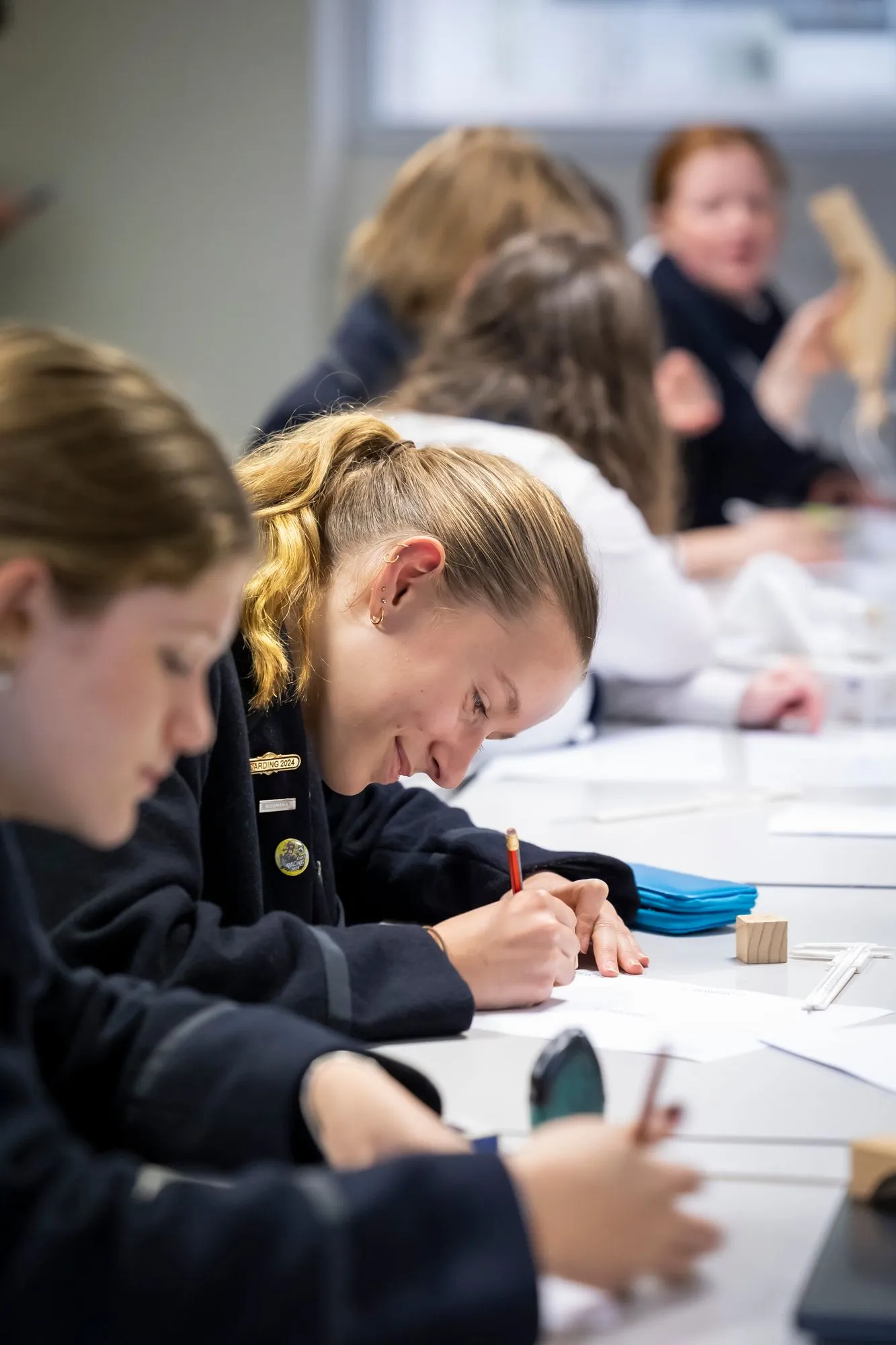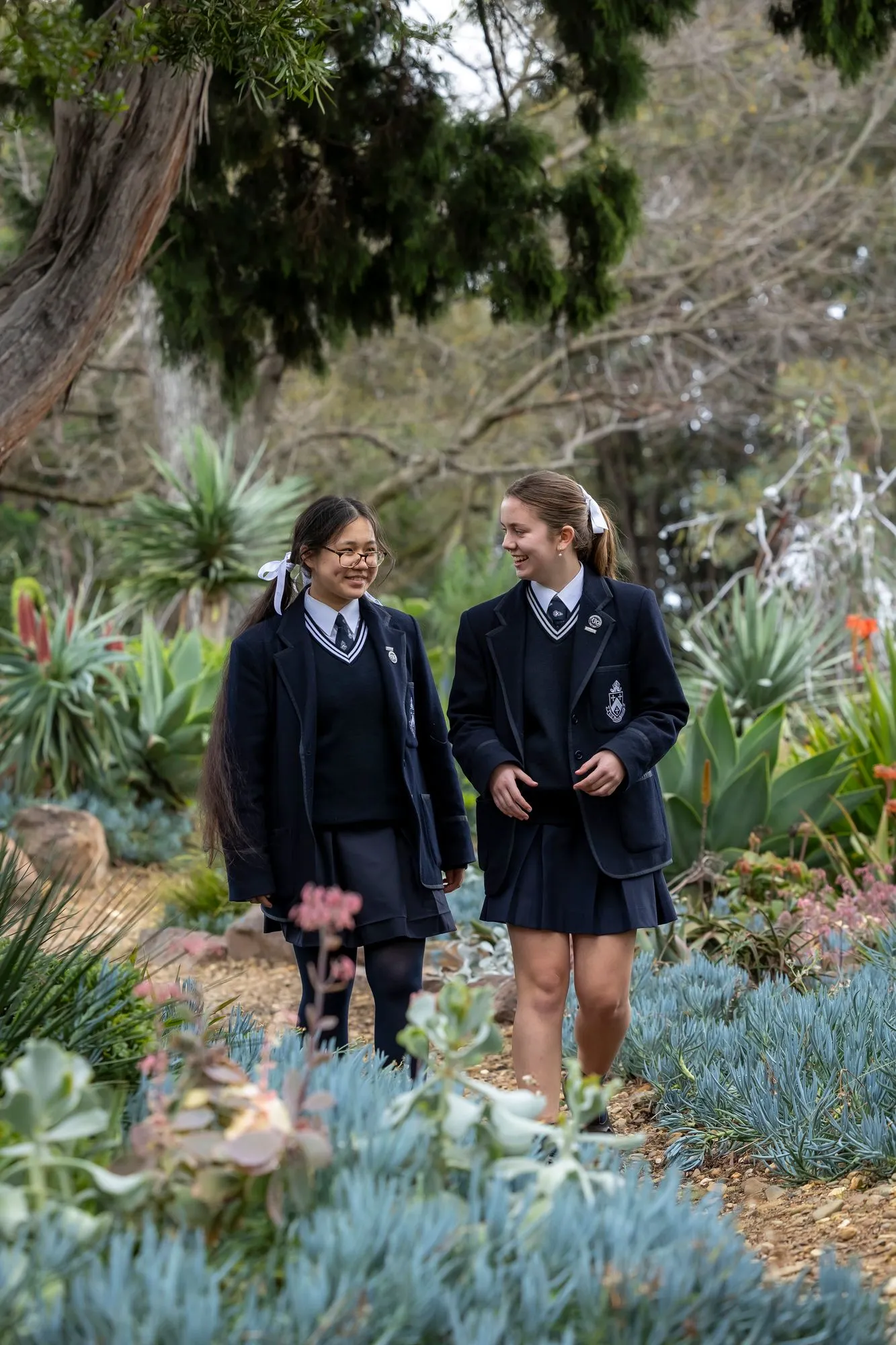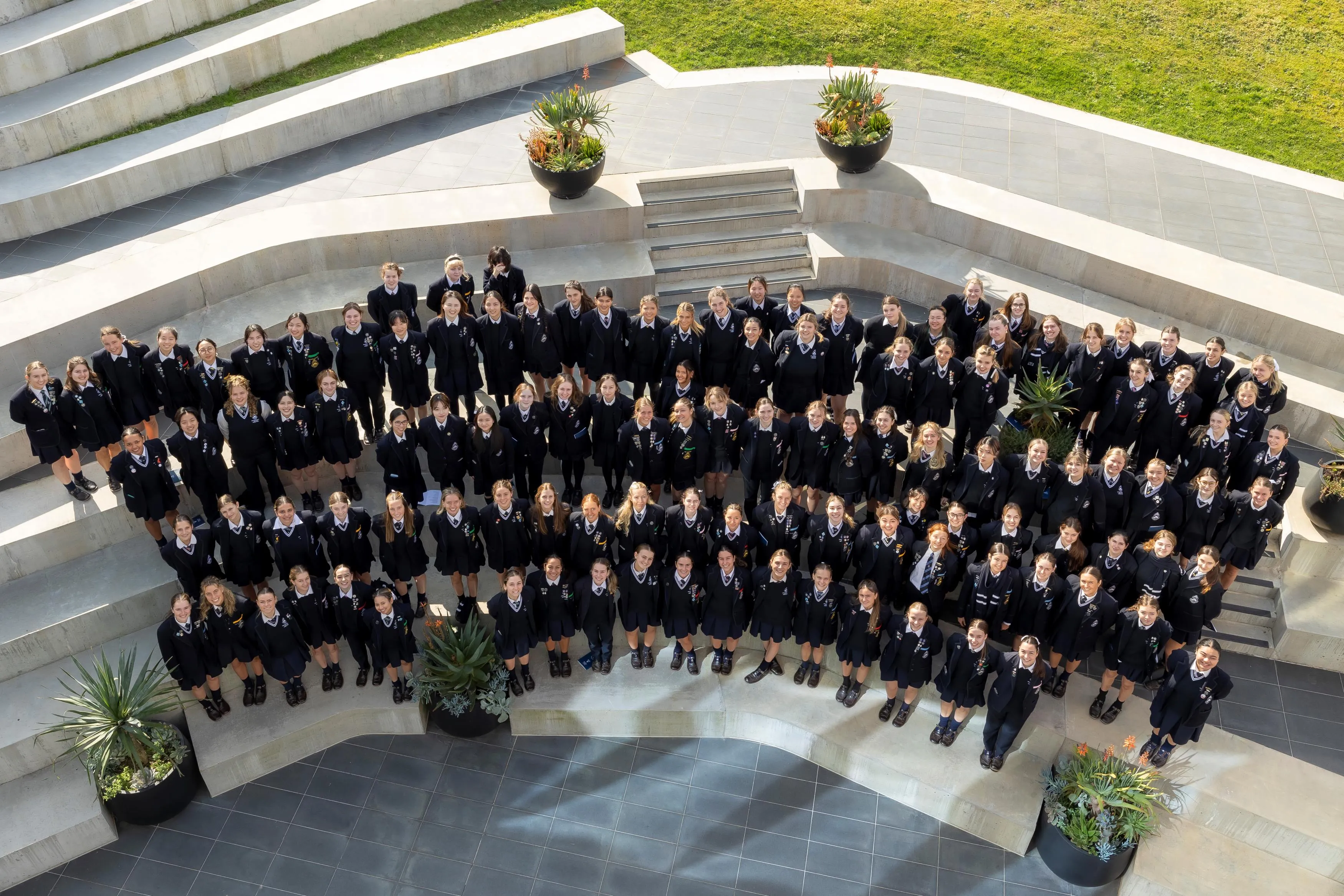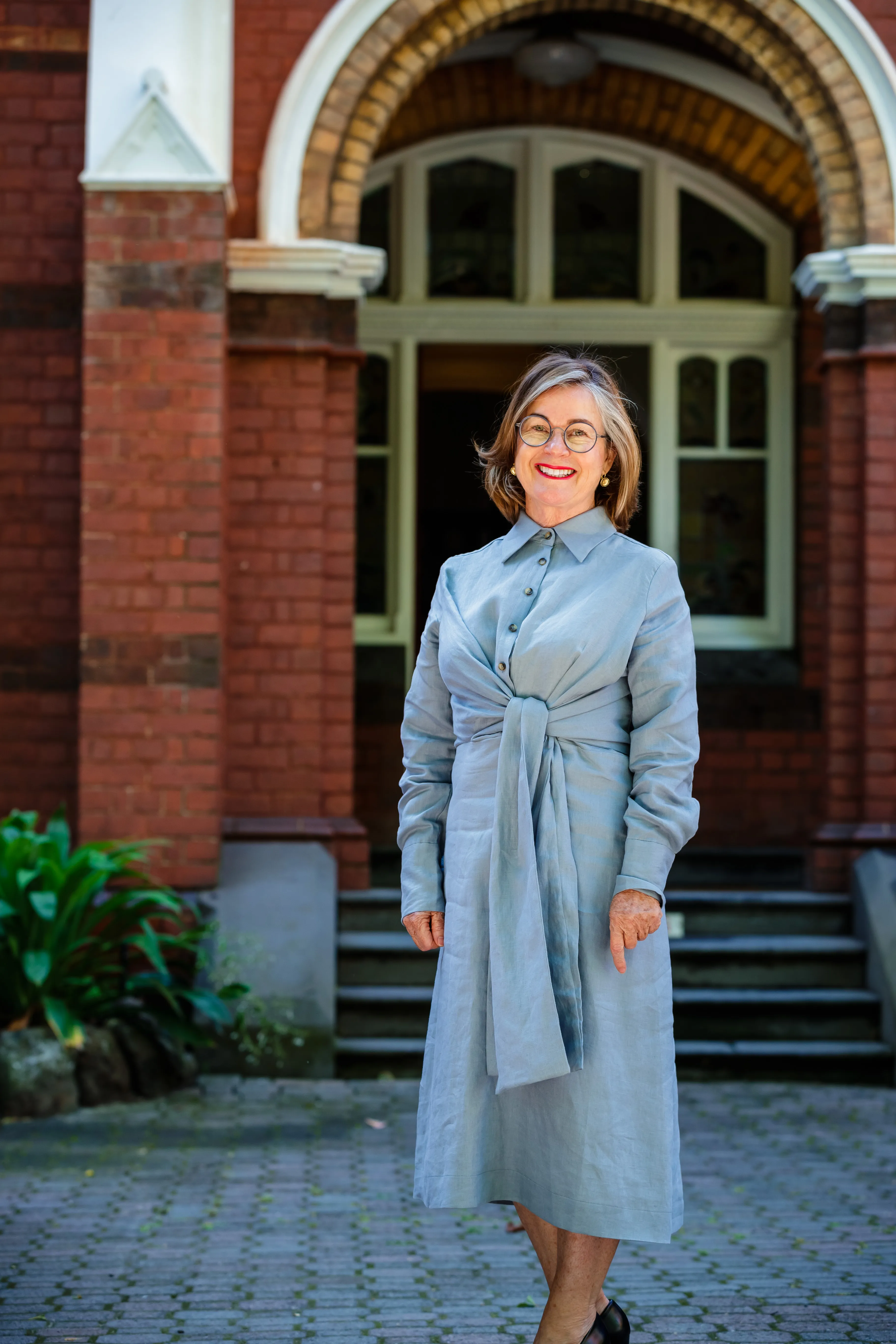



From the Principal
Melbourne Girls Grammar is a scholarly school where the student is placed at the centre of everything we do. I am happy to share this edition of Information Exchange, which is a beautiful representation of how learning at MGGS is purposefully curated, leading to an exceptional education for every Grammarian, from ELC through to VCE and beyond.
Our Grammarians leave our ‘red brick walls’ with the skills and knowledge necessary to select their pathway in life. As ethical women of action, they are a testament to the strong educational foundation we have built throughout our 130-year history.

Each year as Principal, I carefully select a professional learning text that is required reading for all teachers and optional for professional support staff. Interestingly, and quite different to other educational settings I have led in, at MGGS, most professional staff choose to also engage in this specialised reading. The annual text is chosen for its ability to stimulate thinking, provoke conversations and inform our professional practice, bringing colleagues together in a 'whole school' book club. The idea is to create opportunities for our staff to come together to discuss ideas and concepts as a learning community; we share a common language, build pedagogical understanding and an awareness of the world in which we educate.
"...our staff come together to discuss ideas and concepts as a learning community; we share a common language, build pedagogical understanding and an awareness of the world..."
Each year as Principal, I carefully select a professional learning text that is required reading for all teachers and optional for professional support staff. Interestingly, and quite different to other educational settings I have led in, at MGGS, most professional staff choose to also engage in this specialised reading. The annual text is chosen for its ability to stimulate thinking, provoke conversations and inform our professional practice, bringing colleagues together in a 'whole school' book club. The idea is to create opportunities for our staff to come together to discuss ideas and concepts as a learning community; we share a common language, build pedagogical understanding and an awareness of the world in which we educate.
"...our staff come together to discuss ideas and concepts as a learning community; we share a common language, build pedagogical understanding and an awareness of the world..."
Each year as Principal, I carefully select a professional learning text that is required reading for all teachers and optional for professional support staff. Interestingly, and quite different to other educational settings I have led in, at MGGS, most professional staff choose to also engage in this specialised reading. The annual text is chosen for its ability to stimulate thinking, provoke conversations and inform our professional practice, bringing colleagues together in a 'whole school' book club. The idea is to create opportunities for our staff to come together to discuss ideas and concepts as a learning community; we share a common language, build pedagogical understanding and an awareness of the world in which we educate.
"...our staff come together to discuss ideas and concepts as a learning community; we share a common language, build pedagogical understanding and an awareness of the world..."
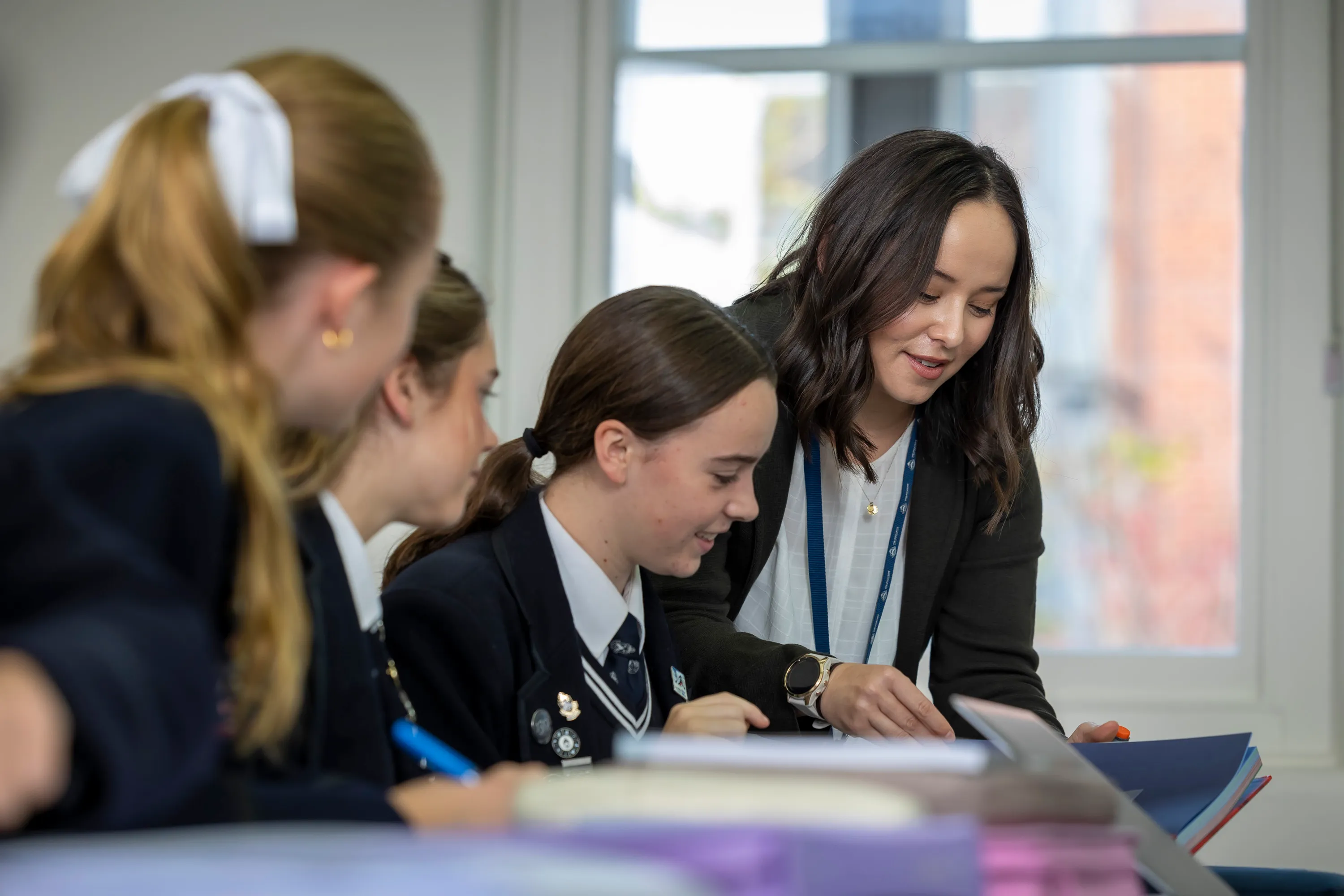

Ms Amanda Watkins answers questions from Year 11 Grammarians, Tabitha, Indigo and Amelie.



Ms Amanda Watkins answers questions from Year 11 Grammarians, Tabitha, Indigo and Amelie.
image
image
image

This year our professional learning text is Johann Hari’s 2022 book Stolen Focus: Why you can’t pay attention. Focus is essential for optimal learning; indeed, it is an essential part of a successful life. Hari claims that our focus is being continually taken from us by a multiplicity of distracting powerful forces, "collapsing our ability to pay attention" (Hari, 2022, p.9). Ongoing professional development for teachers is critical and this text has already raised fabulous discussions about the importance of learning readiness, flow, and the foundations of self-discipline in the classroom.
The role teachers play in harnessing pedagogical practices to create and deliver a highly fulfilling and potential-driven classroom environment cannot be underestimated. After the students, perhaps the second most powerful element to consider in the development of a curriculum is the teacher(s) who will be responsible for its implementation. Research on the effectiveness of educational approaches has shown repeatedly that the single most important variable in determining success is the teacher…"If the educator does not have the skills necessary for implementing the methods and does not believe in its value, it is hopeless to expect the program to be effective." (Maker 1982, p.133)
Our challenge as educators in the provision of curriculum is that students within the one class and of the same age vary in myriad different ways. We see evidence of this in the way each student develops, in their neurodiversity, learning style, interests, social and emotional maturity, and their exposure to life and worldly experiences. The need for differentiation of the curriculum is based on the understanding that individual differences exist. In Victoria, the Department of Education states that "teachers have a responsibility to personalise student learning by providing challenges that will engage young adults with a range of diverse opportunities" (DEECD, 2007, p.2).
"Our challenge as educators...is to develop curriculum that recognises the diversity within our student body, the way each Grammarian approaches learning..."
This year our professional learning text is Johann Hari’s 2022 book Stolen Focus: Why you can’t pay attention. Focus is essential for optimal learning; indeed, it is an essential part of a successful life. Hari claims that our focus is being continually taken from us by a multiplicity of distracting powerful forces, "collapsing our ability to pay attention" (Hari, 2022, p.9). Ongoing professional development for teachers is critical and this text has already raised fabulous discussions about the importance of learning readiness, flow, and the foundations of self-discipline in the classroom.
The role teachers play in harnessing pedagogical practices to create and deliver a highly fulfilling and potential-driven classroom environment cannot be underestimated. After the students, perhaps the second most powerful element to consider in the development of a curriculum is the teacher(s) who will be responsible for its implementation. Research on the effectiveness of educational approaches has shown repeatedly that the single most important variable in determining success is the teacher…"If the educator does not have the skills necessary for implementing the methods and does not believe in its value, it is hopeless to expect the program to be effective." (Maker 1982, p.133)
Our challenge as educators in the provision of curriculum is that students within the one class and of the same age vary in myriad different ways. We see evidence of this in the way each student develops, in their neurodiversity, learning style, interests, social and emotional maturity, and their exposure to life and worldly experiences. The need for differentiation of the curriculum is based on the understanding that individual differences exist. In Victoria, the Department of Education states that "teachers have a responsibility to personalise student learning by providing challenges that will engage young adults with a range of diverse opportunities" (DEECD, 2007, p.2).
"Our challenge as educators...is to develop curriculum that recognises the diversity within our student body, the way each Grammarian approaches learning..."
This year our professional learning text is Johann Hari’s 2022 book Stolen Focus: Why you can’t pay attention. Focus is essential for optimal learning; indeed, it is an essential part of a successful life. Hari claims that our focus is being continually taken from us by a multiplicity of distracting powerful forces, "collapsing our ability to pay attention" (Hari, 2022, p.9). Ongoing professional development for teachers is critical and this text has already raised fabulous discussions about the importance of learning readiness, flow, and the foundations of self-discipline in the classroom.
The role teachers play in harnessing pedagogical practices to create and deliver a highly fulfilling and potential-driven classroom environment cannot be underestimated. After the students, perhaps the second most powerful element to consider in the development of a curriculum is the teacher(s) who will be responsible for its implementation. Research on the effectiveness of educational approaches has shown repeatedly that the single most important variable in determining success is the teacher…"If the educator does not have the skills necessary for implementing the methods and does not believe in its value, it is hopeless to expect the program to be effective." (Maker 1982, p.133)
Our challenge as educators in the provision of curriculum is that students within the one class and of the same age vary in myriad different ways. We see evidence of this in the way each student develops, in their neurodiversity, learning style, interests, social and emotional maturity, and their exposure to life and worldly experiences. The need for differentiation of the curriculum is based on the understanding that individual differences exist. In Victoria, the Department of Education states that "teachers have a responsibility to personalise student learning by providing challenges that will engage young adults with a range of diverse opportunities" (DEECD, 2007, p.2).
"Our challenge as educators...is to develop curriculum that recognises the diversity within our student body, the way each Grammarian approaches learning..."

This concept of optimising focus and increasing learning is not foreign to the MGGS experience. Over the last few years, we have developed our bespoke 'Pedagogical Principles'; educational guidelines that have been designed by us and for us, to progress the educational focus within our School. As experts in girls’ education with over 130 years of experience within this field, we are known for our culture of high performance and deep understanding of the pedagogy required to educate girls and young women. These ‘Principles' guide our curriculum planning, teaching strategies and our decision making in creating an exceptional education for every Grammarian, from ELC through to VCE. Hari’s text adds to our thinking in this space and helps us to design engaging learning that fosters curiosity and a growth mindset within ourselves and in each Grammarian.
As a community of educators, we draw on the work of educational researchers to enhance our teaching skills. They provide further insights into how to optimise the learning taking place at MGGS and we selectively draw on best practice to inform and guide our teaching and learning. We know, for example, through the work of Vygotsky (1962), that the timing of learning is critical. Relevant for every school and classroom, the concept of ‘readiness to learn’ is known as the ‘Zone of Proximal Development’ (ZPD), and our ability to identify and set up these times is crucial to success. ZPD recognises the ability inherent in the individual student, by their developmental level and their potential when presented with a challenge. The ability of our Grammarians to problem solve is enhanced with the curation of their learning by the leading educator – their teacher. Hattie’s (2009) meta-analyses informs us that timing and teacher feedback are fundamental to learning.
Dedicating time to the upskilling of our educators and providing professional feedback on their practices also has the flow on effect of increasing the learning opportunities for everyone in our community. Vygotsky’s theorising recognises the needs of all learners by emphasising the importance of the social environment to encourage higher-order thinking. His focus on the notion of scaffolding – the ‘knowing of learning’ processes – identifies the critical relationship between teacher-student and student-peer interaction. These interactions can potentially differentiate the content and scaffold the learning processes.
This concept of optimising focus and increasing learning is not foreign to the MGGS experience. Over the last few years, we have developed our bespoke 'Pedagogical Principles'; educational guidelines that have been designed by us and for us, to progress the educational focus within our School. As experts in girls’ education with over 130 years of experience within this field, we are known for our culture of high performance and deep understanding of the pedagogy required to educate girls and young women. These ‘Principles' guide our curriculum planning, teaching strategies and our decision making in creating an exceptional education for every Grammarian, from ELC through to VCE. Hari’s text adds to our thinking in this space and helps us to design engaging learning that fosters curiosity and a growth mindset within ourselves and in each Grammarian.
As a community of educators, we draw on the work of educational researchers to enhance our teaching skills. They provide further insights into how to optimise the learning taking place at MGGS and we selectively draw on best practice to inform and guide our teaching and learning. We know, for example, through the work of Vygotsky (1962), that the timing of learning is critical. Relevant for every school and classroom, the concept of ‘readiness to learn’ is known as the ‘Zone of Proximal Development’ (ZPD), and our ability to identify and set up these times is crucial to success. ZPD recognises the ability inherent in the individual student, by their developmental level and their potential when presented with a challenge. The ability of our Grammarians to problem solve is enhanced with the curation of their learning by the leading educator – their teacher. Hattie’s (2009) meta-analyses informs us that timing and teacher feedback are fundamental to learning.
Dedicating time to the upskilling of our educators and providing professional feedback on their practices also has the flow on effect of increasing the learning opportunities for everyone in our community. Vygotsky’s theorising recognises the needs of all learners by emphasising the importance of the social environment to encourage higher-order thinking. His focus on the notion of scaffolding – the ‘knowing of learning’ processes – identifies the critical relationship between teacher-student and student-peer interaction. These interactions can potentially differentiate the content and scaffold the learning processes.
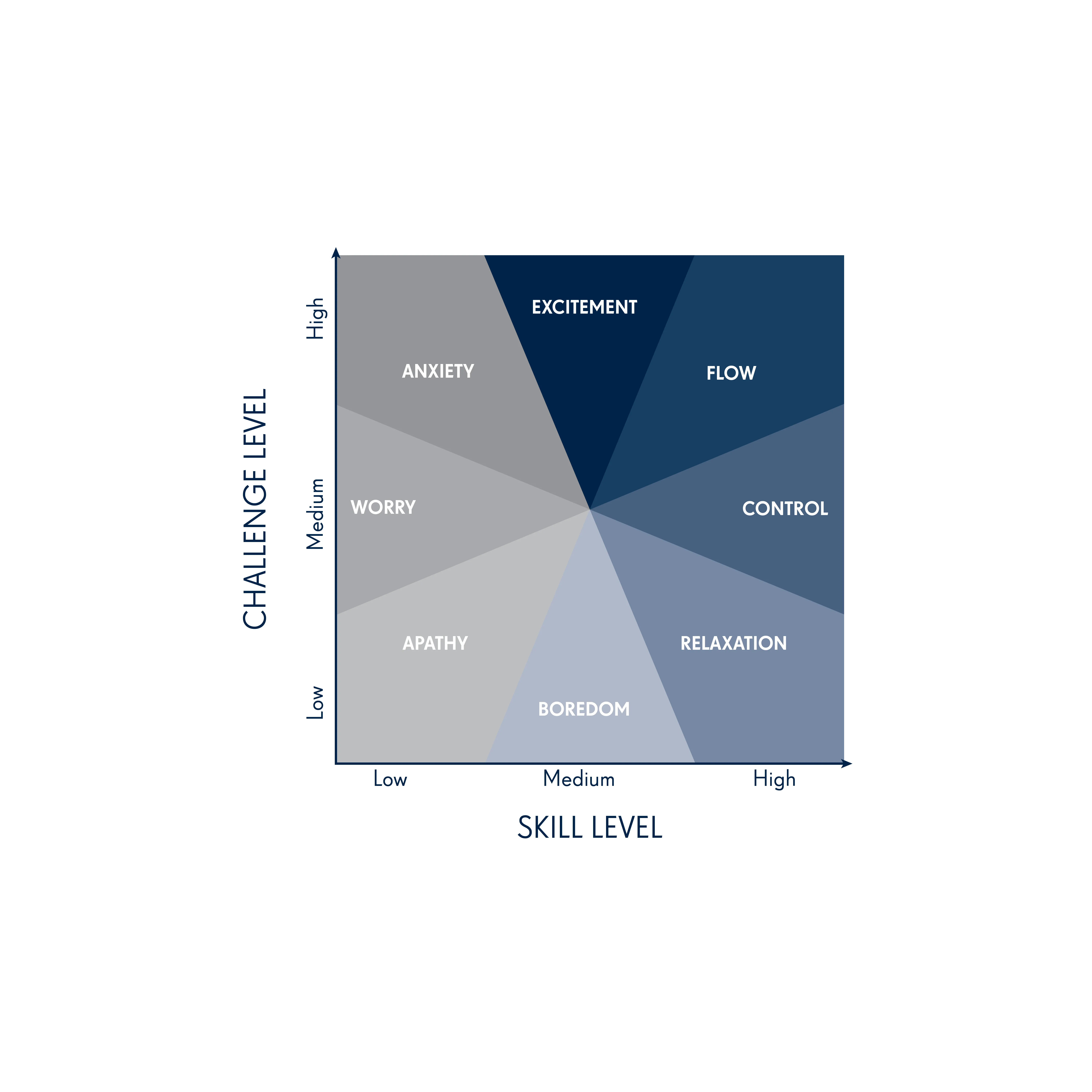

Csikszentmihalyi's (1997) Flow Theory



Csikszentmihalyi's (1997) Flow Theory


Csikszentmihalyi's (1997) Flow Theory
graph
graph
graph

Quite different, yet implicitly supportive of the ZDP, is the theory designed by Csikszentmihalyi known as the ‘Flow Theory’ (1997). Csikszentmihalyi describes ‘flow’ as a state of being when the learner is 100 per cent engaged. This can occur when a challenge is appropriate to the student, and they are working towards the next developmental level. A suitable balance between the challenge level of the task and the skill level of the learner is important. For example, if the curriculum delivered is too challenging and the student has low skill level, a state of ‘anxiety’ occurs. However, add to that a scaffolding of learning processes and the learner moves from 'anxiety' to 'excitement’, and then ideally towards ‘flow’.
If we consider Vygotsky’s theory of proximal development as an overlay to Csikszentmihalyi's theory of the learner, and the curriculum is designed and implemented at a level just within reach of the learner, then the possibility of reaching a state of ‘flow’ is probable. If the teacher is not setting the challenge for the learners at an appropriate level, students are more likely to experience a ‘relaxed’ or ‘bored’ state. This has significant implications for pedagogical delivery within the classroom and the concept of differentiating the curriculum to meet the needs of all learners.
Quite different, yet implicitly supportive of the ZDP, is the theory designed by Csikszentmihalyi known as the ‘Flow Theory’ (1997). Csikszentmihalyi describes ‘flow’ as a state of being when the learner is 100 per cent engaged. This can occur when a challenge is appropriate to the student, and they are working towards the next developmental level. A suitable balance between the challenge level of the task and the skill level of the learner is important. For example, if the curriculum delivered is too challenging and the student has low skill level, a state of ‘anxiety’ occurs. However, add to that a scaffolding of learning processes and the learner moves from 'anxiety' to 'excitement’, and then ideally towards ‘flow’.
If we consider Vygotsky’s theory of proximal development as an overlay to Csikszentmihalyi's theory of the learner, and the curriculum is designed and implemented at a level just within reach of the learner, then the possibility of reaching a state of ‘flow’ is probable. If the teacher is not setting the challenge for the learners at an appropriate level, students are more likely to experience a ‘relaxed’ or ‘bored’ state. This has significant implications for pedagogical delivery within the classroom and the concept of differentiating the curriculum to meet the needs of all learners.
Quite different, yet implicitly supportive of the ZDP, is the theory designed by Csikszentmihalyi known as the ‘Flow Theory’ (1997). Csikszentmihalyi describes ‘flow’ as a state of being when the learner is 100 per cent engaged. This can occur when a challenge is appropriate to the student, and they are working towards the next developmental level. A suitable balance between the challenge level of the task and the skill level of the learner is important. For example, if the curriculum delivered is too challenging and the student has low skill level, a state of ‘anxiety’ occurs. However, add to that a scaffolding of learning processes and the learner moves from 'anxiety' to 'excitement’, and then ideally towards ‘flow’.
If we consider Vygotsky’s theory of proximal development as an overlay to Csikszentmihalyi's theory of the learner, and the curriculum is designed and implemented at a level just within reach of the learner, then the possibility of reaching a state of ‘flow’ is probable. If the teacher is not setting the challenge for the learners at an appropriate level, students are more likely to experience a ‘relaxed’ or ‘bored’ state. This has significant implications for pedagogical delivery within the classroom and the concept of differentiating the curriculum to meet the needs of all learners.
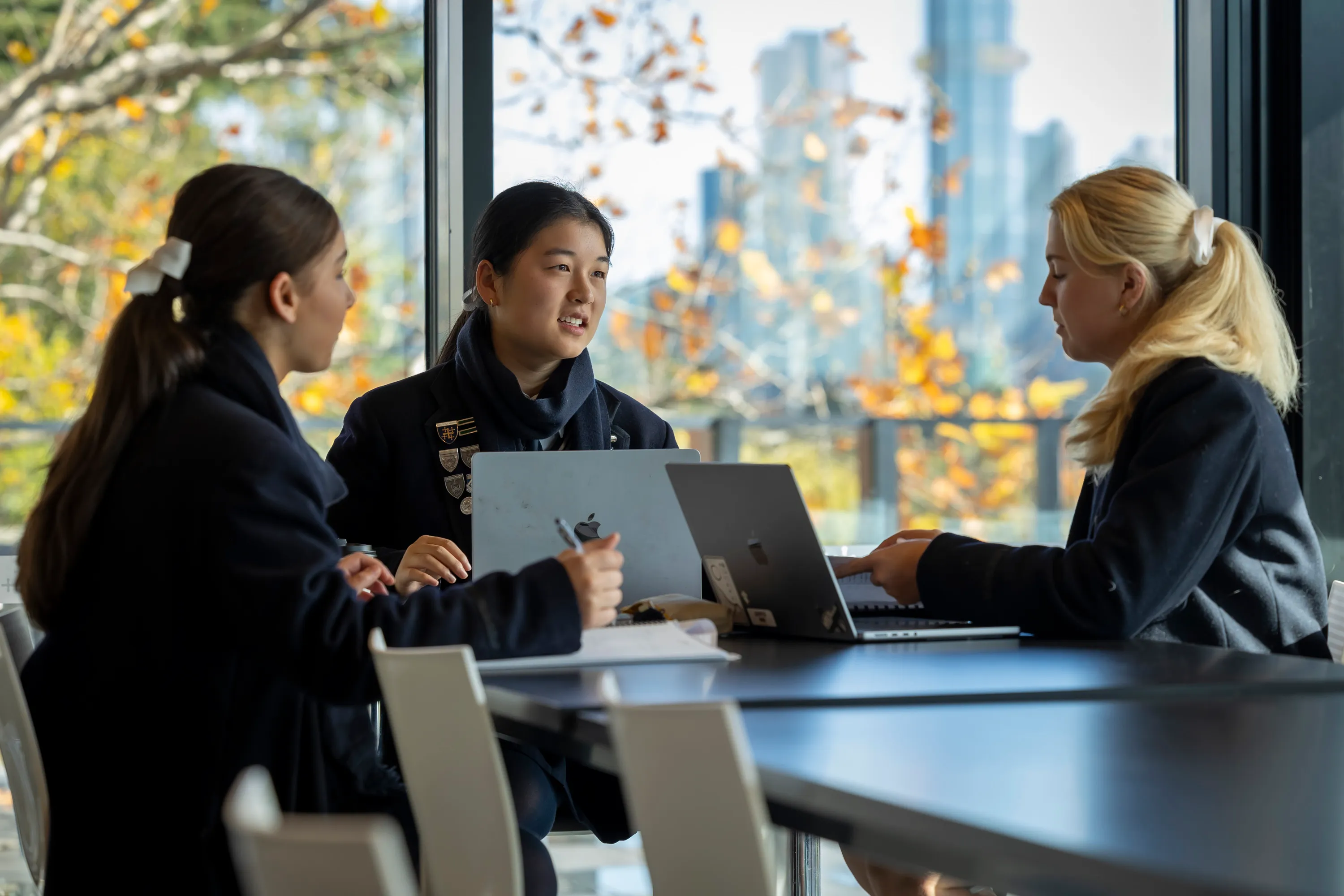

Stephanie, Cecilia and Annabelle study together in the Artemis Learning Commons.



Stephanie, Cecilia and Annabelle study together in the Artemis Learning Commons.


Stephanie, Cecilia and Annabelle study together in the Artemis Learning Commons.
image
image
image
Stephanie, Cecilia and Annabelle study together in the Artemis Learning Commons.

At MGGS, part of our solution is to remain focused when designing and delivering our classroom instruction, specifically on planning for the development of each child by carefully weaving our professional and pedagogical knowledge to support this. We are recognised for our expertise at a state, national and international level, because nothing regarding learning is left to chance. Rather, learning at MGGS is purposefully curated, highly engaging and focused on getting each learner into their ‘flow’ state.
At MGGS, part of our solution is to remain focused when designing and delivering our classroom instruction, specifically on planning for the development of each child by carefully weaving our professional and pedagogical knowledge to support this. We are recognised for our expertise at a state, national and international level, because nothing regarding learning is left to chance. Rather, learning at MGGS is purposefully curated, highly engaging and focused on getting each learner into their ‘flow’ state.
At MGGS, part of our solution is to remain focused when designing and delivering our classroom instruction, specifically on planning for the development of each child by carefully weaving our professional and pedagogical knowledge to support this. We are recognised for our expertise at a state, national and international level, because nothing regarding learning is left to chance. Rather, learning at MGGS is purposefully curated, highly engaging and focused on getting each learner into their ‘flow’ state.

References:
Csikszentmihalyi, M. (1997). Finding flow. New York: Basic Books.
Csikszentmihalyi, M. (1998). Society, Culture and Person: A Systems View of Creativity. In R. J. Department of Education and Early Childhood Development (2008). Blueprint 2 for Schools: Future Directions in the Victorian Curriculum. Melbourne: DEECD.
Hari, J. (2022). Stolen Focus: Why You Can’t Pay Attention. Bloomsbury Publishing, London, UK.
Hattie, J. (2009). Visible learning: A synthesis of over 8000 meta-analyses relating to achievement. New York: Routledge.
Maker, C. J. (1982a). Curriculum development. Rockville, Maryland: Aspen Publishers.
Melbourne Girls Grammar School. (2023). MGGS Pedagogical Principles: The Thinking School, South Yarra, Australia.
Vygotsky, L. S. (1962). Thought and Language. Cambridge, MA: MIT Press.
References:
Csikszentmihalyi, M. (1997). Finding flow. New York: Basic Books.
Csikszentmihalyi, M. (1998). Society, Culture and Person: A Systems View of Creativity. In R. J. Department of Education and Early Childhood Development (2008). Blueprint 2 for Schools: Future Directions in the Victorian Curriculum. Melbourne: DEECD.
Hari, J. (2022). Stolen Focus: Why You Can’t Pay Attention. Bloomsbury Publishing, London, UK.
Hattie, J. (2009). Visible learning: A synthesis of over 8000 meta-analyses relating to achievement. New York: Routledge.
Maker, C. J. (1982a). Curriculum development. Rockville, Maryland: Aspen Publishers.
Melbourne Girls Grammar School. (2023). MGGS Pedagogical Principles: The Thinking School, South Yarra, Australia.
Vygotsky, L. S. (1962). Thought and Language. Cambridge, MA: MIT Press.
References:
Csikszentmihalyi, M. (1997). Finding flow. New York: Basic Books.
Csikszentmihalyi, M. (1998). Society, Culture and Person: A Systems View of Creativity. In R. J. Department of Education and Early Childhood Development (2008). Blueprint 2 for Schools: Future Directions in the Victorian Curriculum. Melbourne: DEECD.
Hari, J. (2022). Stolen Focus: Why You Can’t Pay Attention. Bloomsbury Publishing, London, UK.
Hattie, J. (2009). Visible learning: A synthesis of over 8000 meta-analyses relating to achievement. New York: Routledge.
Maker, C. J. (1982a). Curriculum development. Rockville, Maryland: Aspen Publishers.
Melbourne Girls Grammar School. (2023). MGGS Pedagogical Principles: The Thinking School, South Yarra, Australia.
Vygotsky, L. S. (1962). Thought and Language. Cambridge, MA: MIT Press.






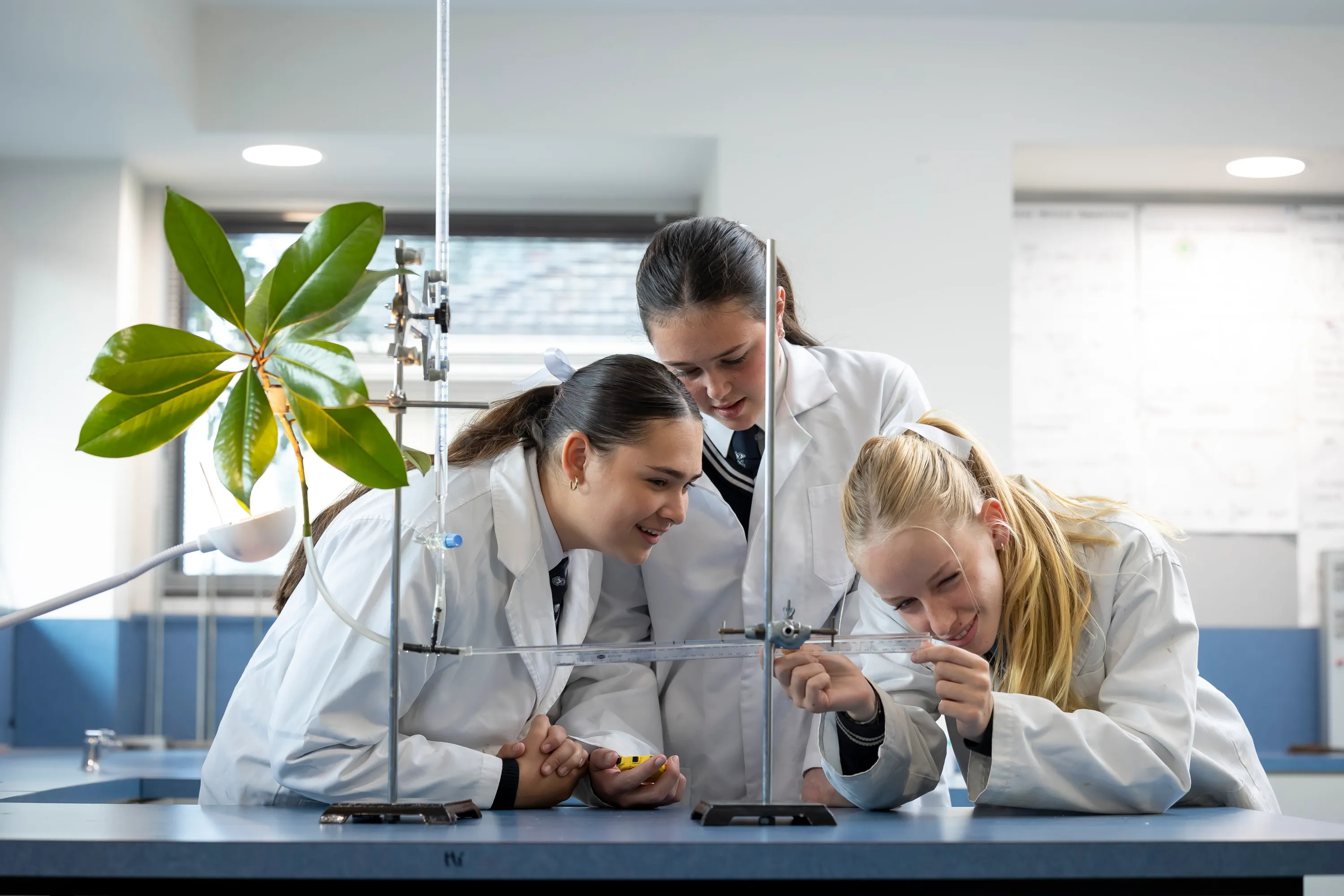

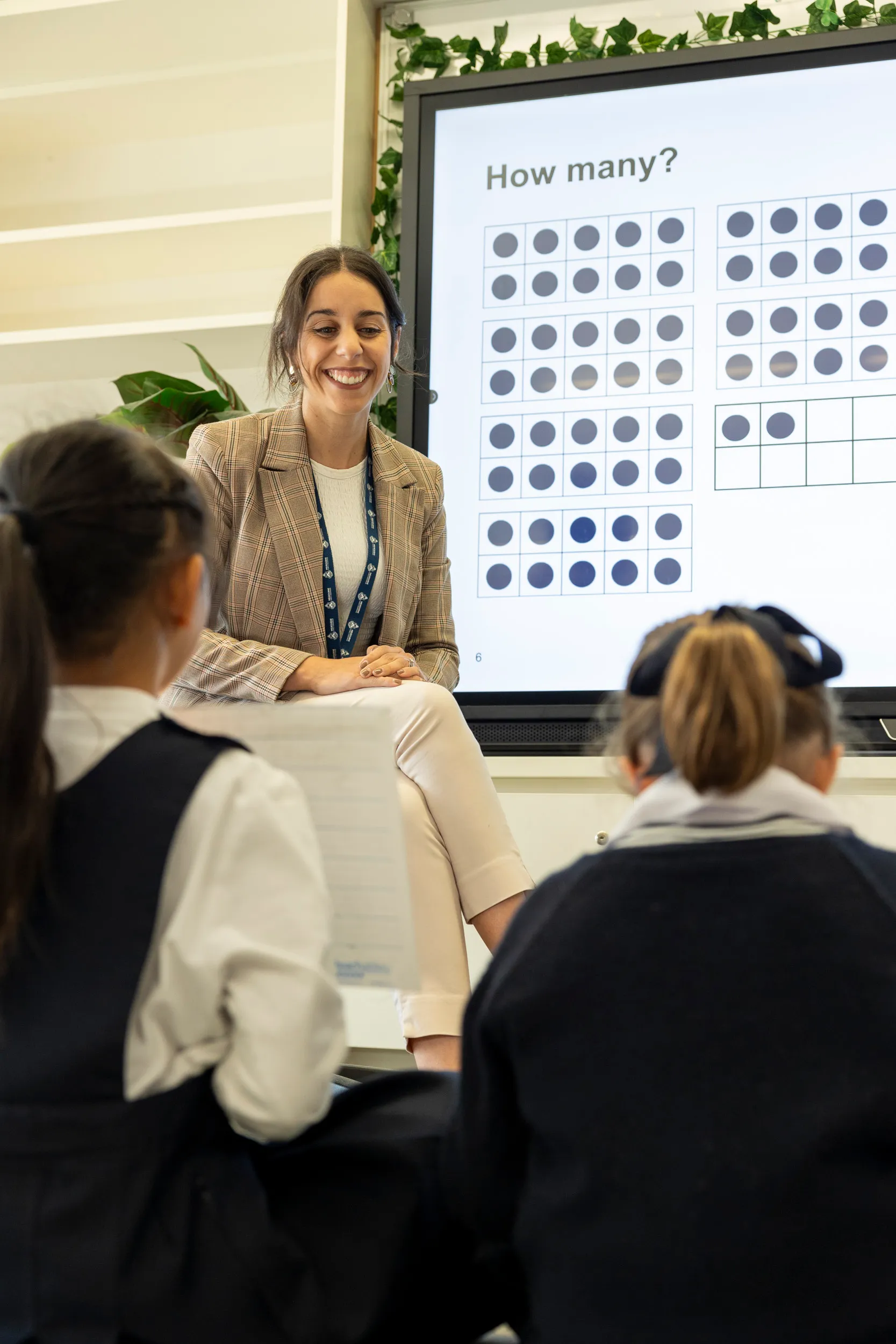
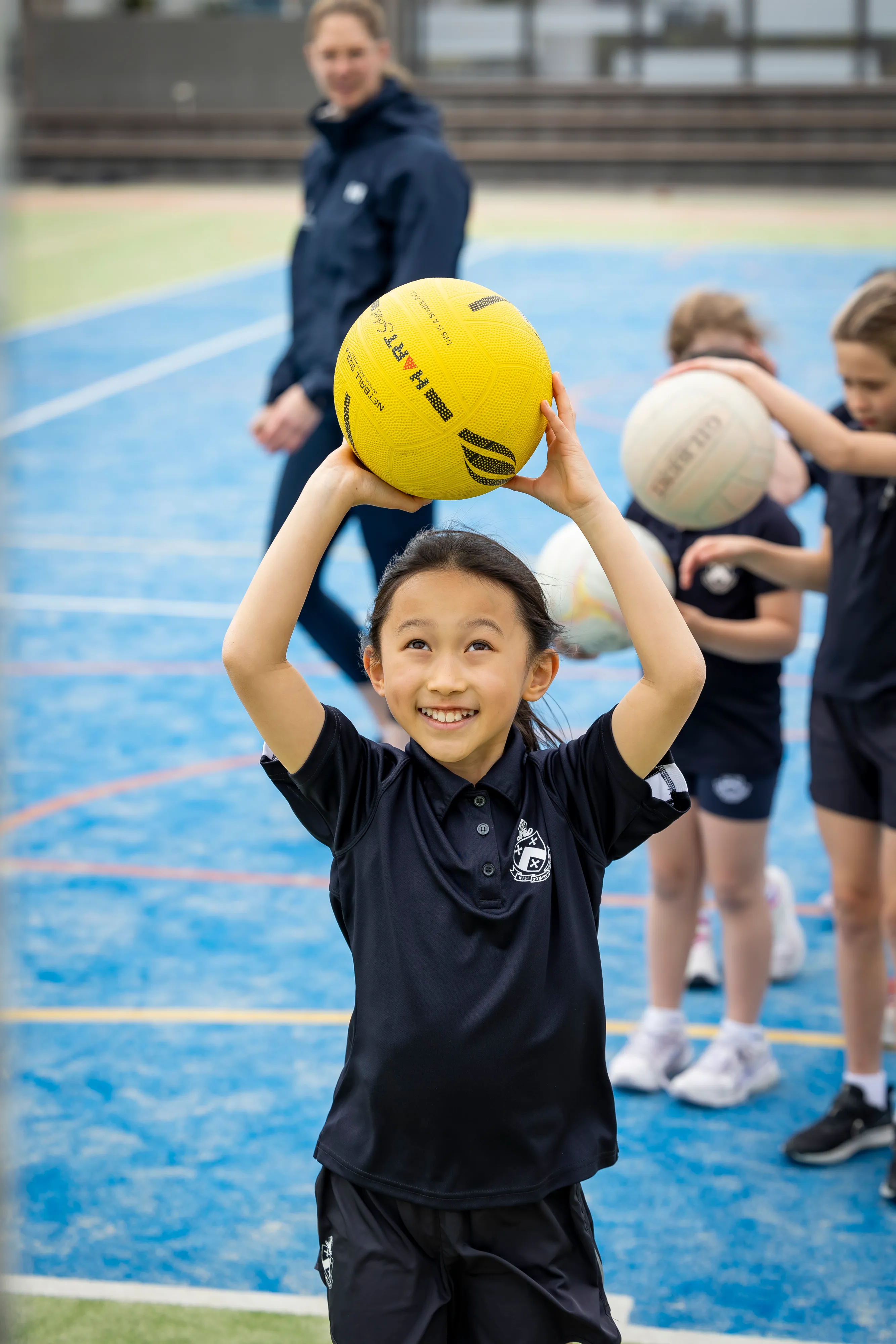
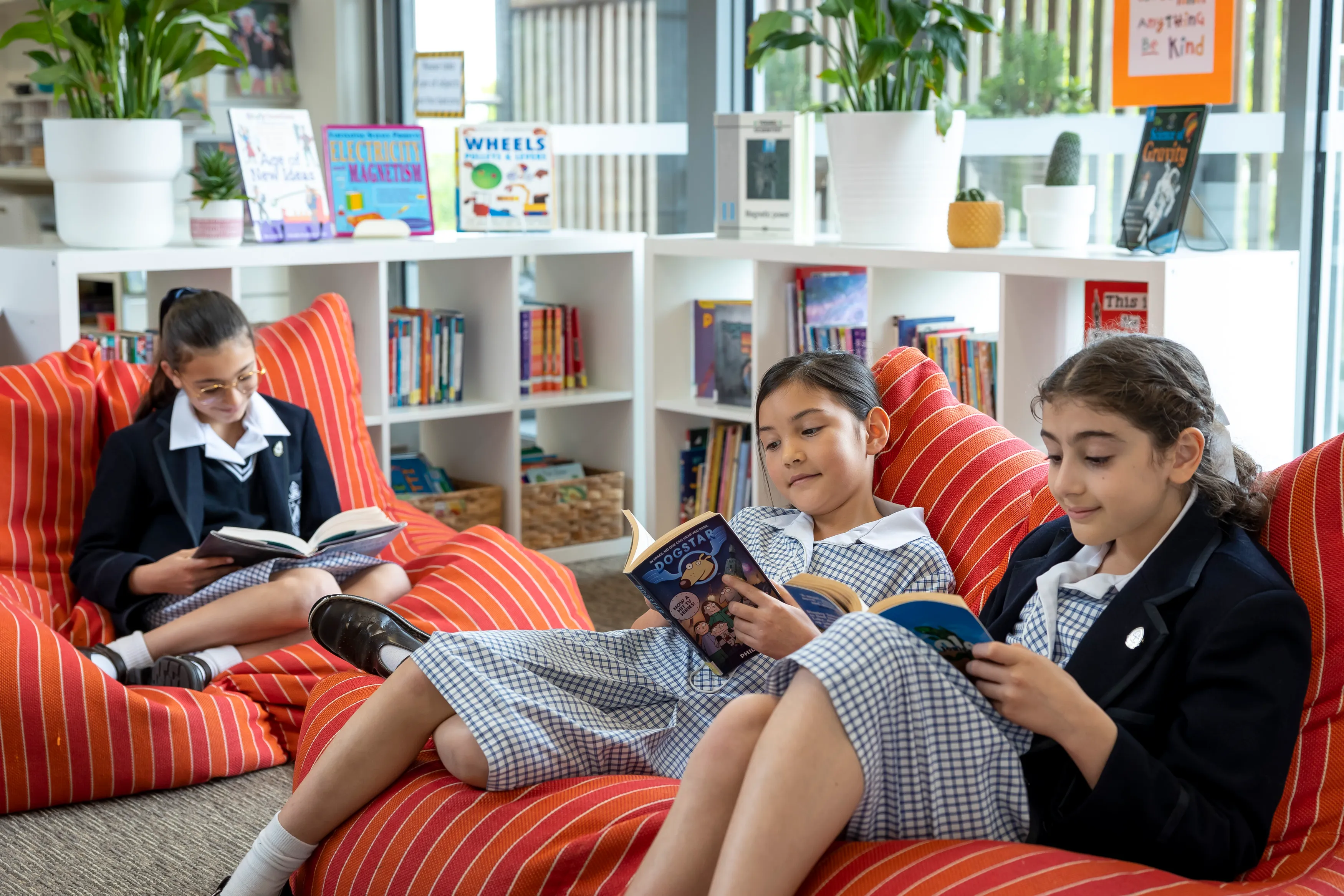
.jpg)
